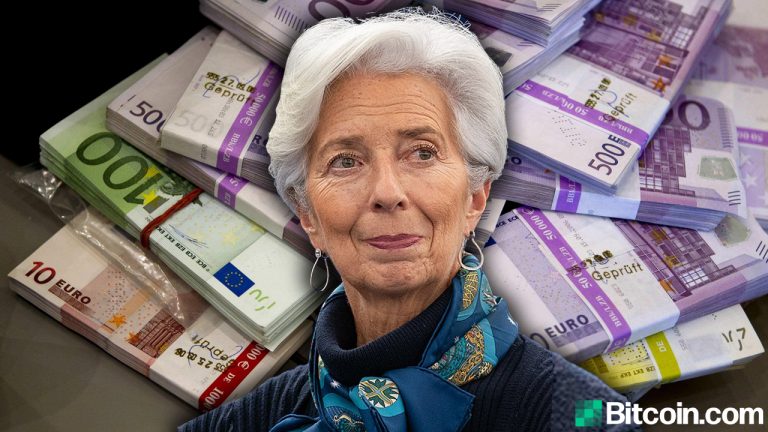 The vice president of the European Central Bank (ECB), Luis de Guindos, has warned that crypto assets are “not a real investment” and are “subject to a lot of volatility.” His comments followed massive sell-offs across a broad range of cryptocurrencies. ECB VP Says Crypto Is Not a Real Investment European Central Bank Vice President […]
The vice president of the European Central Bank (ECB), Luis de Guindos, has warned that crypto assets are “not a real investment” and are “subject to a lot of volatility.” His comments followed massive sell-offs across a broad range of cryptocurrencies. ECB VP Says Crypto Is Not a Real Investment European Central Bank Vice President […]
European Central Bank vice president Luis de Guindos is expecting more sudden price swings for cryptocurrencies as the market sheds $750 billion in a week.
Luis de Guindos, vice president of the European Central Bank, has dismissed the value proposition of cryptocurrencies as investment assets.
Speaking to Bloomberg TV, the ECB vice president remarked that crypto should not be seen as a real investment. “When you have difficulties to find out what are the real fundamentals of an investment, then what you’re doing is not a real investment,” de Guindos argued, adding:
“This is an asset with very weak fundamentals, and that is going to be subject to a lot of volatility.”
According to de Guindos, the current market drawdown is not different from the explosive surge recorded between quarter four of 2020 and quarter one of 2021. Indeed, the ECB executive opined that the present decline is symptomatic of the volatility of the cryptocurrency market.
Earlier in May, Bank of England Governor Andrew Bailey warned that crypto investors were liable to lose their money. While de Guindos’s argument on Wednesday hinged on weak fundamentals and volatility, Bailey contended that crypto lacked intrinsic value during a conference held earlier in the month.
Indeed, crypto prices have been on the decline in the last week, with Bitcoin (BTC) shedding over $15,000 from its price. In all, the market has lost over $750 billion, with about half of the slump occurring in the last 24-hour trading period.
The current decline has seen the percent of unique Bitcoin entities in profit slide to its lowest level since the Black Thursday crash of 2020.
Bitcoin has rebounded on the three previous occasions when this metric fell amid a significant bullish advance, and crypto proponents will most likely be hopeful of a repeat in this regard.
Meanwhile, record Bitcoin inflows are hitting crypto exchanges, with data from crypto on-chain monitoring service Glassnode indicating that newer entrants are responsible for the bulk of the selling pressure.
 The president of the European Central Bank (ECB), Christine Lagarde, warned that cryptocurrencies are prone to money laundering. She agrees with the governor of the Bank of England, Andrew Bailey, who recently said that cryptocurrencies have no intrinsic value and investors should be prepared to lose all their money if investing in them. ECB Chief […]
The president of the European Central Bank (ECB), Christine Lagarde, warned that cryptocurrencies are prone to money laundering. She agrees with the governor of the Bank of England, Andrew Bailey, who recently said that cryptocurrencies have no intrinsic value and investors should be prepared to lose all their money if investing in them. ECB Chief […] Faced with challenges on many fronts, the European Central Bank is now deepening the analysis of how to digitalize its currency. A decision on whether to issue a digital euro, which has the potential to become a major CBDC, is expected around mid-2021, a high-ranking official of the central bank has confirmed. Eurozone’s Central Bank […]
Faced with challenges on many fronts, the European Central Bank is now deepening the analysis of how to digitalize its currency. A decision on whether to issue a digital euro, which has the potential to become a major CBDC, is expected around mid-2021, a high-ranking official of the central bank has confirmed. Eurozone’s Central Bank […]
A former Apple executive believes the European Central Bank might just be paying lip service to the concept of privacy in relation to a digital euro.
When European Central Bank board member Fabio Panetta addressed the European Union Committee on Economic and Monetary Affairs in April, he emphasized the importance of privacy in any potential future CBDC rollout.
The ECB had conducted a public consultation on the possibility of a digital euro, canvassing the opinions of over 8,000 individuals and businesses. The responses that came back suggested privacy was the number one concern surrounding the issuance of a central bank digital currency.
With 43% of respondents highlighting privacy as the core requirement, Panetta declared that the digital euro could meet those requirements without relaxing security standards.
Other responses from the survey highlighted the need for a digital euro to provide secure payments (18%), while others focused on cross-border payments within the European Union (11%). Some respondents highlighted the need for low fees (9%), and the ability to use the system even if it’s offline (8%).
“As I have already mentioned, privacy emerges as the most important feature of a digital euro. Protecting users’ personal data and ensuring a high level of confidentiality will therefore be a priority in our work,” said Panetta.
Indeed, the ECB has been exploring privacy enhancing techniques since even before the concept of a digital euro emerged. Preliminary research suggested that a digital system could still be monitored for illicit activity, while still allowing for transparency and privacy.
But while the ECB appears to be making all the right noises concerning a potential CBDC rollout, not everyone agrees that the final outcome will be so rosy.
Former product manager at Apple, and now chief operating fficer of Oasis Labs, Anne Fauvre-Willis, said the EU had proven amenable to the concept of consumer privacy in the past. But that won’t count for much if the digital euro is issued on a centralized system.
“The EU has had a good track record around consumer privacy but it’s still a centralized system,” Fauvre-Willis told Cointelegraph, adding, “Instead of enabling this via a centralized bank, why not empower a decentralized protocol to do this instead?
Were a digital euro to be issued on the Ethereum blockchain for example, it would be subject to the same level of decentralization and autonomy as Ether (ETH), and every other token issued via Ethereum.
But the possibility of a central bank ceding all control of its money supply to a decentralized network seems extremely unlikely.
What’s more, the natural desire for human beings to take the easiest path available could see users flock to the digital euro, regardless of how much privacy they give up in the process, says Fauvre-Willis.
“In regards to people adopting the digital euro, unfortunately I think ease will win over privacy alone,” said Fauvre-Willis.
“Privacy is a feature but it’s not enough to drive people on its own to change their behavior. Instead for those of us who really believe in privacy we have to simultaneously strive to make compelling and life changing products and as we do we need to put privacy at the center of what we make,” she added.
The ECB is still conducting research into the possibility of a digital euro, with the final decision expected to be made by summer 2021.
 The European Central Bank President Christine Lagarde is keeping the central bank’s monetary easing policies unchanged according to her statements from a press conference last Thursday. Moreover, the central bank’s Twitter account recently shared a video of Lagarde defending negative interest rates, as the bank’s President stresses that they “support companies and people in the […]
The European Central Bank President Christine Lagarde is keeping the central bank’s monetary easing policies unchanged according to her statements from a press conference last Thursday. Moreover, the central bank’s Twitter account recently shared a video of Lagarde defending negative interest rates, as the bank’s President stresses that they “support companies and people in the […]
Decentralized CBDCs will most likely pique the interest of the masses much more than their centralized counterparts.
As central bank digital currencies, or CBDCs, continue to garner mainstream traction across the global financial landscape in recent years, almost all central banks are actively researching the benefits and risks of offering a digital currency to the public.
In its most basic sense, a CBDC is a digital form of fiat money, backed by a suitable amount of monetary reserves like gold or foreign currency reserves. Each CBDC unit acts as a secure digital instrument equivalent and can be used as a way of payment, a store of value and an official unit of account. What distinguishes them from stablecoins — similar digital offerings whose value is pegged to fiat — is that they are government-issued and backed by central bank-issued money, making them completely regulated.
Related: Did CBDCs affect the crypto space in 2020, and what’s next in 2021? Experts answer
China’s Digital Currency Electronic Payment, or DCEP, project is arguably the most advanced CBDC trial, which has already been rolled out for consumer testing across major regions of the country including Beijing, Suzhou, Shenzhen and, most recently, Chengdu. With the country aiming to release the digital yuan before next year’s Winter Olympics, China is positioning itself as a global leader within the digital currency sector.
While the digital yuan was initially quite limited in its overall scope of use, its expansion has been quite explosive over the course of the last few months, with the digital currency most recently being utilized for a number of large-scale digital transactions including online shopping, ATM withdrawals, etc.
Furthermore, to help people understand the value proposition put forth by CBDCs, the Chinese government has already engaged with several educational blockchain projects, to help its population deepen their understanding in regard to decentralized technology, smart contracts and other niches related to this ever-evolving space.
Related: How the digital yuan stablecoin impacts crypto in China: Experts answer
As things stand, in order for a CBDC to be adopted by any state, it needs to comply with the region’s existing monetary policies. Central banks, while curious about CBDCs, are still quite apprehensive about digital assets, since they introduce a level of decentralization into the equation that quite directly challenges the way in which their existing governance protocols work.
For those governments looking to digitalize their economies through the use of CBDCs, it seems quite obvious that in order for these offerings to truly succeed, they need to benefit from arguably the most revolutionary aspect put forth by cryptocurrencies and blockchain tech as a whole: decentralization.
Related: A nightmare on Stable Street: Centralized stablecoins may be doomed
While most of the CBDC projects that have been envisioned over the last few years seek to enable peer-to-peer transactions, they tend to make use of governance frameworks that are authoritarian in nature — i.e., they are centralized and controlled by a single body. However, as public trust in governments and banking institutions continues to erode, there is little incentive for consumers to adopt such kinds of CBDCs.
Related: Central bank digital currencies are dead in the water
Therefore, it stands to reason that there truly does exist a real window of opportunity for the creation of digital currencies that are decentralized in their governance and overall scope of utilization. In fact, there are already solutions in the market today that can help make this vision a living reality.
There are blockchain ecosystems that come replete with decentralized digital identity solutions that can allow central banking institutions to quite easily and efficiently weed out the identities of individuals suspected of committing crimes while protecting the privacy of its other CBDC users.
Related: Decentralized identity is the way to fighting data and privacy theft
Such platforms do not require users to upload information directly onto a server, but instead upload encrypted information that is only transmitted via a secure end-to-end encrypted network that cannot be intercepted. What’s more, since such frameworks allow CBDCs to function in a totally decentralized, transparent manner, they can facilitate the creation of complex logic contracts and financial instruments such as bonds, derivatives, etc.
The most commonly employed architectural design for retail CBDCs comes in the form of a permissioned distributed system that does not have to necessarily reside on a blockchain. As a result, these systems tend to feature a single point of failure, and given how important CBDCs can potentially be to a country’s economic growth, such risks need to be mitigated at all costs.
That being said, if a CBDC were to be devised in a distributed fashion, the aforementioned risks could be completely eliminated from the picture.
Related: Interoperability will determine CBDC winners and losers
Another point to consider is that centralized blockchains are still relatively slow, thus the use of decentralized solutions, such as distributed ledger technology, stands to make CBDC transactions much faster and far more streamlined. To help digital currencies grow, transaction speeds need to be extremely efficient, otherwise a payment system that is reliant on such tokens is unlikely to succeed.
Decentralization also allows individuals to own their own wallets, as well as be in possession of their private keys — basically meaning that the custody of one’s coins is always with the individual, not with a centralized body. This can help avoid many of the data breaches we’ve seen in the past, which could otherwise be catastrophic if, for example, the funds were stored in one single location.
Another argument for the decentralization of fiat-backed cryptocurrencies is that as more and more countries start to make use of CBDCs and stablecoins, central banks all over the world will try to tighten their regulatory purse strings over these offerings, since they stand to put a dent in their control over payments, banking and the supply of money.
In this regard, the European Central Bank, or ECB, recently told European Union lawmakers that it wants complete veto authority when it comes to the launch of stablecoins, such as Facebook’s Diem in the eurozone, as well as a larger role when it comes to the supervision and regulation of digital assets.
EU members have been working toward creating a comprehensive set of rules for the governance of crypto assets — including stress tests and capital and liquidity requirements — since September 2020. A recent guideline reads as follows:
“Where an asset-reference arrangement is tantamount to a payment system or scheme, the assessment of the potential threat to the conduct of monetary policy, and to the smooth operation of payment systems, should fall within the exclusive competence of the ECB.”
Even the ECB is working on its own digital euro, with the asset most likely to make its way into the global financial ecosystem after thorough regulatory scrutiny and testing within the next four years or so.
The views, thoughts and opinions expressed here are the author’s alone and do not necessarily reflect or represent the views and opinions of Cointelegraph.